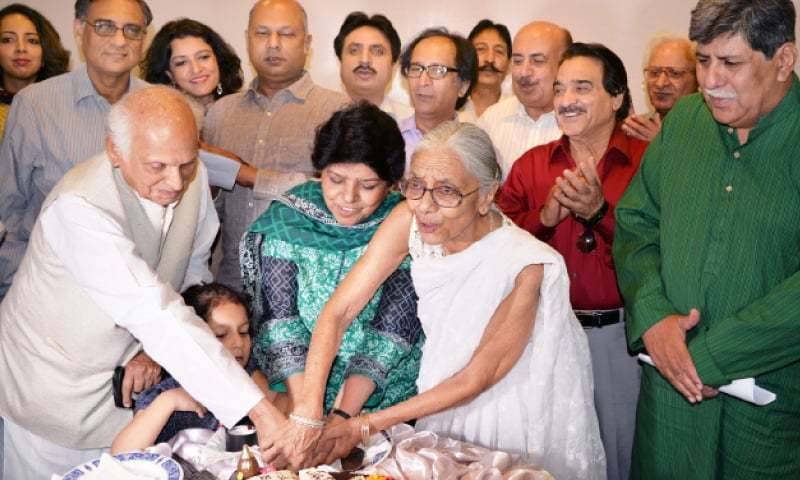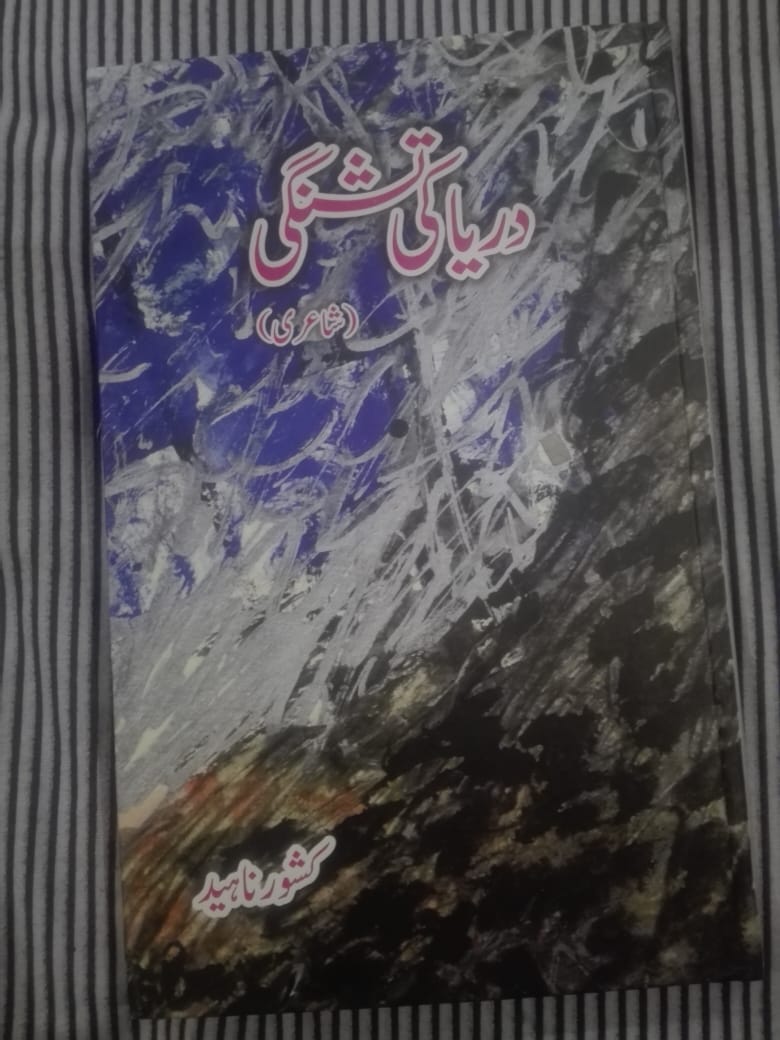
Kishwar Naheed who turned 80 this past June is a leading Urdu poet of our times. She symbolises feminism with the valiant women of South Asia in general, and Pakistan in particular. Despite turning 80, and being diagnosed with COVID–19 soon, she continues to dazzle with one poetic collection after another. Therefore, it was a privilege to read her latest collection of poetry, titled Darya Ki Tishnagi (The Thirst of the River, Sang-e-Meel Publications, 2020), published just last week. Many of the poems in this slim volume deal with the ravages of COVID-19, but none more so than the last poem in the collection titled Do Hazar Bees Ka Alamiya: Teesri Duniya Mein (The Tragedy of 2020: In the Third World). Here, she masterfully contrasts the ravages of COVID – 19 in the West and the global South, and the eternal contest between hope and despair.
Naheed of course is on the side of the poor and underprivileged, and her acerbic but empathetic pen does not fail to note that it is in Pakistan where exorbitant amounts of wealth are being displayed. But at the same time, there is the poverty of life. Her frequent refrain – Kisi Ke Saamne Haath Nahi Phailaa Sakte (We Cannot Beg From Just Anyone) – is not only a comment on poverty but a critique of the so-called self-respect of middle-class and indigent families. This self-respect does not let them approach other kindred spirits for solidarity and sustenance in bad times. Our poet is forced to admit at the end:
Karona badh raha hai
Insaniyat mar rahi hai
Saal guzar chuka hai!

The poem is being presented in my humble original English translation on the occasion of New Year’s Eve in the hope that it will stimulate and provoke us to take stock of the annus horribilis that 2020 was and the hope the next year of 2021 may bring.
(This year Corona
Has trampled upon every economy
Neither is there a street vendor nor a bar that is occupied
To leave home out of compulsion is allowed
But when there is no work or duty
Why come out unnecessarily
In Europe people standing in the balcony
Are playing the guitars merrily.
In countries like ours
Whether it is the media or the mosque sermons
All of them are agents of terror.
“Do not touch anybody
Keep social distancing”
Despite all this prohibition
Every evening kebabs are skewered in preparation
Every morning pooris and parathas being made for consumption
Every day from homes and hospitals
Hundreds of funerals rise in lamentation
Weddings, birthdays, offerings
Go on with abandon.
The middle class selling its cars
Has started riding bicycles
Dearness too is spreading like Corona
People in the whole world
Are asked to work from homes
These are those lands where electricity and other privileges are available
In countries like ours people wearing masks
Carry lunch in hand like railway workers’ tasks
Children remaining in their homes do plead
For something or the other to fulfil their need
All the saved rice, flour, treacle
Even after using little by little
Looking at the empty boxes
They cannot beg before anybody
Cannot even ask for a matchstick
How to amuse the children crying in the courtyards
The man with the crisp rice and the monkey show
Too does not come in the street anymore
The husband and wife are sick of each other
While settling the home accounts
Fight with each other
They cannot beg before anybody
The aged father and mother locked up at home
Are afflicted with dementia
They say something with a scream
Beyond understanding’s realm.
Listening to the media, one feels asphyxiation
All countries are covered in the dust of humiliation.
But within the same year
The world’s most expensive car
Is bought in Pakistan
And in a wedding conducted in old age
The groom arrives with one kilo of gold
Over there families are being broken
To lift and bury the corpses
One cannot find four people.
Melodies of union and songs of separation
Instead of malhaar in homes there is lamentation
A wall stands joined with a wall
But even to talk to a neighbour
Is to be in fear’s thrall
Lest they borrow something
A long line of people buried worldwide
Seem like the Great Wall of China
When seen from a plane
The folks of the old peoples’ homes verily
Have passed away silently
Suicides have risen heavily
Funerals too are rising gradually
But the times of rush are ascending quickly
In Western countries the Red Cross
Is distributing ration among people standing in a line
The tradition of poor countries
They cannot beg before anybody.
In the West, people eat food from the dustbin
In the East, holding the head high
Is indeed the culture, the tradition.
Corona is advancing
Humanity is dying
The year has passed!)
Naheed of course is on the side of the poor and underprivileged, and her acerbic but empathetic pen does not fail to note that it is in Pakistan where exorbitant amounts of wealth are being displayed. But at the same time, there is the poverty of life. Her frequent refrain – Kisi Ke Saamne Haath Nahi Phailaa Sakte (We Cannot Beg From Just Anyone) – is not only a comment on poverty but a critique of the so-called self-respect of middle-class and indigent families. This self-respect does not let them approach other kindred spirits for solidarity and sustenance in bad times. Our poet is forced to admit at the end:
Karona badh raha hai
Insaniyat mar rahi hai
Saal guzar chuka hai!

The poem is being presented in my humble original English translation on the occasion of New Year’s Eve in the hope that it will stimulate and provoke us to take stock of the annus horribilis that 2020 was and the hope the next year of 2021 may bring.
(This year Corona
Has trampled upon every economy
Neither is there a street vendor nor a bar that is occupied
To leave home out of compulsion is allowed
But when there is no work or duty
Why come out unnecessarily
In Europe people standing in the balcony
Are playing the guitars merrily.
In countries like ours
Whether it is the media or the mosque sermons
All of them are agents of terror.
“Do not touch anybody
Keep social distancing”
Despite all this prohibition
Every evening kebabs are skewered in preparation
Every morning pooris and parathas being made for consumption
Every day from homes and hospitals
Hundreds of funerals rise in lamentation
Weddings, birthdays, offerings
Go on with abandon.
The middle class selling its cars
Has started riding bicycles
Dearness too is spreading like Corona
People in the whole world
Are asked to work from homes
These are those lands where electricity and other privileges are available
In countries like ours people wearing masks
Carry lunch in hand like railway workers’ tasks
Children remaining in their homes do plead
For something or the other to fulfil their need
All the saved rice, flour, treacle
Even after using little by little
Looking at the empty boxes
They cannot beg before anybody
Cannot even ask for a matchstick
How to amuse the children crying in the courtyards
The man with the crisp rice and the monkey show
Too does not come in the street anymore
The husband and wife are sick of each other
While settling the home accounts
Fight with each other
They cannot beg before anybody
The aged father and mother locked up at home
Are afflicted with dementia
They say something with a scream
Beyond understanding’s realm.
Listening to the media, one feels asphyxiation
All countries are covered in the dust of humiliation.
But within the same year
The world’s most expensive car
Is bought in Pakistan
And in a wedding conducted in old age
The groom arrives with one kilo of gold
Over there families are being broken
To lift and bury the corpses
One cannot find four people.
Melodies of union and songs of separation
Instead of malhaar in homes there is lamentation
A wall stands joined with a wall
But even to talk to a neighbour
Is to be in fear’s thrall
Lest they borrow something
A long line of people buried worldwide
Seem like the Great Wall of China
When seen from a plane
The folks of the old peoples’ homes verily
Have passed away silently
Suicides have risen heavily
Funerals too are rising gradually
But the times of rush are ascending quickly
In Western countries the Red Cross
Is distributing ration among people standing in a line
The tradition of poor countries
They cannot beg before anybody.
In the West, people eat food from the dustbin
In the East, holding the head high
Is indeed the culture, the tradition.
Corona is advancing
Humanity is dying
The year has passed!)
